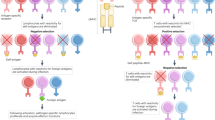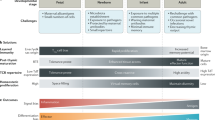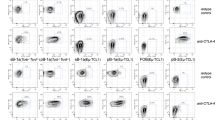Abstract
An individual's immune system must be capable of responding to a wide variety of antigens, but must not react against tissues of the individual itself. The specificity of this ‘self tolerance’ is determined early in life1–3 and recent work has dealt with the mechanisms by which self tolerance is maintained4,5. We report here a study designed to determine whether products of the major histocompatibility complex are involved in the induction of self tolerance; in particular, whether the induction of self tolerance in the mouse is H–2 restricted. H–2 restriction refers to the finding that mouse T cells generally recognize foreign antigens only when presented in association with the products of H–2 alleles6–8. We questioned whether T-cell precursors are made tolerant directly by antigen alone, or whether the antigen must be associated in the cell membrane with an appropriate H–2 molecule. We find that T-cell tolerance to ‘self’ membrane components does not seem to be H–2 restricted and discuss the possibility that this apparent lack of H–2 restriction is due to antigen processing.
This is a preview of subscription content, access via your institution
Access options
Subscribe to this journal
Receive 51 print issues and online access
$199.00 per year
only $3.90 per issue
Buy this article
- Purchase on Springer Link
- Instant access to full article PDF
Prices may be subject to local taxes which are calculated during checkout
Similar content being viewed by others
References
Owen, R. D. Science 102, 400 (1945).
Billingham, R. E., Brent, L. & Medawar, P. B. Phil. Trans. R. Soc. 239, 357 (1956).
Triplett, E. L. J. Immun. 89, 505 (1962).
Dorsch, S. & Roser, B. J. exp. Med. 145, 1144 (1977).
Beverly, P. C. L., Brent, L., Brooks, C., Medawar, P. B. & Simpson, E. Transplantn Proc. 5, 679 (1973).
Zinkernagel, R. M. & Doherty, P. C. Nature 248, 701 (1974).
Shearer, G. M. Eur. J. Immun. 4, 527 (1974).
Bevan, M. J. J. exp. Med. 142, 1349 (1975).
Klein, J. Transplant 15, 137 (1973).
Cohn, M. & Blomberg, B. Scand. J. Immun. 4, 1 (1975).
Bevan, M. J. Nature 269, 417 (1977).
Zinkernagel, R. M. et al. J. exp. Med. 147, 882 (1978).
Matzinger, P. & Mirkwood, G. J. exp. Med. 148, 84 (1978).
Staats, J. Cancer Res. 36, 4333 (1976).
Flaherty, L. Immunogenetics 3, 533 (1976).
Lindahl, K. Immunogenetics 8, 71 (1979).
Billingham, R. E. & Silvers, W. E. J. Immun. 85, 14 (1960).
Von Boehmer, H., Haas, W. & Helmut, P. J. exp. Med. 147, 1291 (1977).
Korngold, R. & Sprent, J. J. exp. Med. 151, 314 (1980).
Matzinger, P. & Dutton, R. W. (in preparation).
Author information
Authors and Affiliations
Rights and permissions
About this article
Cite this article
Matzinger, P., Waterfield, J. Is self tolerance H–2 restricted?. Nature 285, 492–494 (1980). https://doi.org/10.1038/285492a0
Received:
Accepted:
Issue Date:
DOI: https://doi.org/10.1038/285492a0
This article is cited by
-
Does T-cell tolerance require a dedicated antigen-presenting cell?
Nature (1989)
-
Essential requirement for major histocompatibility complex recognition in T-cell tolerance induction
Nature (1984)
-
Self tolerance is H–2-restricted
Nature (1984)
-
Genetically restricted antigen presentation for immunological tolerance and suppression
Nature (1984)
Comments
By submitting a comment you agree to abide by our Terms and Community Guidelines. If you find something abusive or that does not comply with our terms or guidelines please flag it as inappropriate.



